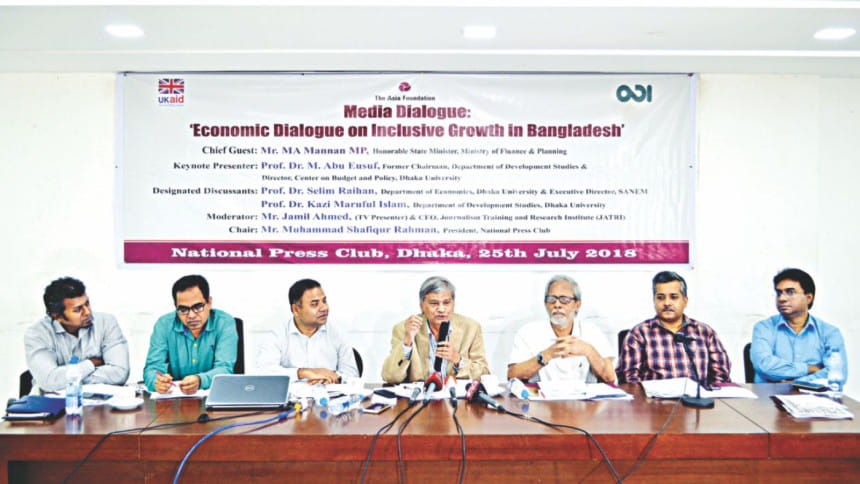Income inequality hinders inclusive growth: experts

The rise in income inequality in Bangladesh is the main obstacle to achieving inclusive growth, said experts yesterday.
“Though Bangladesh has been experiencing sustained growth in recent years, the country is failing to produce sustained improvements in human welfare for regions equally,” said M Abu Eusuf, former chairman of the University of Dhaka's development studies department.
“In view of spatial dimensions of poverty and income inequality, there exist signs that remote and ecologically vulnerable areas are usually characterised by a higher incidence of poverty,” he said.
Eusuf was presenting a keynote paper at a dialogue on inclusive growth organised by The Asia Foundation in National Press Club in the capital.
Citing a recent study, Eusuf said the poorest 10 percent of the household population received 1.01 percent of the total national income in 2016 and 2 percent in 2010. In comparison, the richest 10 percent of the population owned 38.16 percent of the national income in 2016 and 35.84 percent in 2010, he said.
It is widely acknowledged that an economy cannot grow in a sustainable manner unless the benefits of growth are shared fairly among individuals or groups in a society, he added.
However, he said, the country has progressed, working to create 100 special economic zones to stimulate economic growth and to provide employment alongside putting emphasis on poverty reduction which would eventually lead to sustained and inclusive growth.
Bangladesh demonstrated considerable improvement in terms of gender equality and women's empowerment over the period of the Sixth Five-Year Plan, Eusuf said. The Labour Force Survey 2015 found an increase in women's participation in the labour force from 29.2 percent in 2005-06 to 33.5 percent in 2013 and to 35.6 percent in 2015-16.
He said more investment was necessary to increase access to education and skills development opportunities for the growing number of unemployed youth.
MA Mannan, state minister for finance and planning, said inclusive governance was essential for inclusive growth. “Jobless growth is another major factor which poses a hindrance to generating inclusive growth,” he said.
Muhammad Shafiqur Rahman, president of National Press Club; Jamil Ahmed, CEO of Journalism Training and Research Institute, Bangladesh, and Selim Raihan, executive director of the South Asian Network on Economic Modeling, also spoke.

 For all latest news, follow The Daily Star's Google News channel.
For all latest news, follow The Daily Star's Google News channel. 



Comments